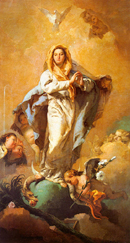
'Questions and Answers' -Volume II - Precepts 1949 - Canon
E. J. Mahoney, D.D.
It seems that Sunday is profaned more by excessive amusement
than by servile woks. Are there any restrictions, in the laws
of the Church, on the amusements permitted?
The Church having in mind the sanctification of Sunday, forbids
certain occupations (canon 1248) which, for the majority of
people, are liable to withhold their minds for the service of
God. There are other reasons for the law which, while secondary,
are closely connected with this purpose: to protect the labourer
form becoming a beast of burden, to give some opportunity for
the quiet enjoyment of family life; to secure a period not only
for rest and recreation, but for the higher mental activities
proper to the dignity of human beings. The law of the Church
has all these purposes in view, but they are subordinated to
the chief purpose of sanctifying one day in the week by devoting
it to the service of God.
It is essential to consider this purpose in order that a judgement
concerning forbidden occupations may be given with some sense
of proportion; but we must not be unmindful of the axiom finis
precepti non cadit sub praecepto. The law forbids servile
work sub praecepto. A person who abstains from servile work
keeps the law even though he may offend against the virtue of
religion in other ways. But there is considerable danger that
the conscience of the faithful may become somewhat pharisaical
on the point, with the result that while keeping the letter
of the law which forbids servile work, they fail to sanctify
Sunday by spending their time in other occupations which are
completely at variance with the whole spirit of the law. It
is a point which confessors should remember, when assisting
penitents to solve doubts of conscience arising from that aspect
of Sunday observance which is concerned solely with avoiding
servile work.
If the dominant purpose of the law is kept in mind, we can
readily perceive that its subordinate purposes, for example,
amusement and recreation, are liable to be exaggerated. Two
instance may be cited of episcopal prohibition of activities,
which are clearly not servile, but which tend to frustrate the
chief purpose of the law.
The first is contained in a collective pastoral letter issued
21 November, 1927, and signed by the seventeen bishops of the
provinces of Quebec, Montreal and Ottawa. It protests against
the profanation of Sunday by devoting the day to pleasures and
amusements, even those of an otherwise harmless character, even
those organized for charitable purposes and it concludes: "By
our authority and in conformity with Catholic tradition and
our Conciliar laws, we remind all Catholics that they are under
a grave obligation not to frequent places organized by commercial
and financial interests, and we formally forbid the faithful
of our dioceses to organize any amusement, for which entrance
money is paid, even when the proceeds are to be devoted to religious
and charitable works." 1
The second instance is an instruction, issued by the Bishop
of Treves, telling the clergy to oppose all outdoor excursions,
gymnastic fetes, and sporting events on Sunday morning. These
practices are forbidden, not precisely because they result quite
often in people missing Mass, but because the custom of hearing
a hurried early Mass, or attending a crowded chapel in some
pleasure resort, while fulfilling the precept of Sunday Mass,
is not in keeping with a proper sanctification of the day. 2
These two instances are instructive because the things forbidden
do not come under the category of forbidden work; lucrative
occupation is not; amusement and sport certainly are not. All
Catholic colleges in this country encourage sports and games
on Sunday. They are forbidden in the localities mentioned because
the bishops, whose province it is to rule the Church of God,
judge that these lawful pursuits are being abused to such an
extent that the sanctification of the day is threatened and
the Christian conscience offended by these departures from good
sound Catholic custom. But there exists no common law on the
subject.
_________________________________
1Documentation Catholique, 1928 XIX, col. 363
2Op. Cit., 1925, XIV, col. 916.






